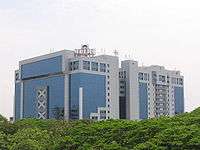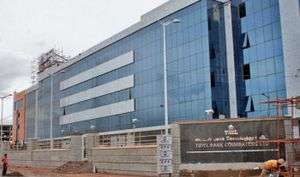Economy of Tamil Nadu
| Statistics | |
|---|---|
| GDP | ₹13,842 billion (US$210 billion) (2014-15) |
| GDP rank | 2nd |
GDP per capita | $3,000 (2014-15) |
GDP per capita rank | 3rd |
GDP by sector |
Agriculture: 21% Industry: 34% Services: 45% (2014-15) |
| Public finances | |
| ₹1.35 lakh crore (US$20 billion) (2012) | |
|
| |
Tamil Nadu has the second largest economy in India with a current GSDP of ₹13,842 billion (US$210 billion). Per capita GDP of Tamil Nadu was $3,000 in the year 2014–15, the third highest in India. Over 50% of the state is urbanized, accounting for 9.6% of the urban population in the country while only comprising 6% of India's total population. Services contributes to 45% of the economic activity in the state, followed by manufacturing at 34% and agriculture at 21%. Government is the major investor in the state with 51% of total investments, followed by private Indian investors at 29.9% and foreign private investors at 14.9%. It has been ranked asa the most economically free state in India by the Economic Freedom Rankings for the States of India.[1]
Macroeconomic trend
This is a chart of trend of gross state domestic product of Tamil Nadu at market prices estimated in Crore Indian rupees.
| Year | Gross state domestic product |
|---|---|
| 2011 | 751910 |
| 2015 | 976703 |
| 2020 | 2183000 |
Agriculture
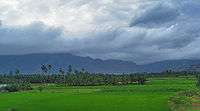
Tamil Nadu has historically been an agricultural state, while its advances in other fields launched the state into competition with other areas. Agriculture is heavily dependent on the river water and monsoon rains. The perennial rivers are Palar, Cheyyar, Ponnaiyar, Kaveri, Meyar, Bhavani, Amaravati, Vaigai, Chittar and Tamaraparani. Non-perennial rivers include the Vellar, Noyyal, Suruli, Siruvani, Gundar, Vaipar, Valparai and Varshali. Tamil Nadu is also the leading producer of kambu, corn, rye, groundnut, oil seeds and sugarcane in India. At present, Tamil Nadu is India's second biggest producer of rice.[2] Tamil Nadu is the home to Dr. M. S. Swaminathan, known as the "father of the Green Revolution" in India.[3] The town of Namakkal is a major poultry hub of India and Erode is one of the major producers of turmeric in India.
Industry and manufacturing
One of the global electrical equipment public sector company BHEL has manufacturing plants at Tiruchirappalli and Ranipet. The Tamil Nadu state government owns the Tamil Nadu Newsprint and Papers (TNPL),[4] the world's biggest bagasse-based paper mills in Karur as well as the world's sixth largest manufacturer of watches together with TATA, under the brand name of "Titan".[5] 40 percent of all wind-generated electricity in India is created by windmills in Tamil Nadu. Danish wind power company NEG Micon has established its manufacturing unit in Chennai.[6] Tamil Nadu is a leading producer of cement in India and with manufacturing units located at Karur, Tiruchirappalli, Coimbatore and Ariyalur. High-density PolyEthylene (HDPE) mono filament yarn and associated products are manufactured in Karur. More than 2,000 units in & around the town manufacture fabrics for mosquito nets and fishing nets. More than 60% mosquito nets in India are manufactured in & around Karur which directly employs 50,000 people. The region around Salem is rich in mineral ores. The country's largest steel public sector undertaking, SAIL, has a steel plant in Salem.
Coimbatore is also referred to as "the Pump City" as it supplies two thirds of India's requirements of motors and pumps. The city is one of the largest exporters of jewellery, wet grinders, poultry and auto components and the term "Coimbatore Wet Grinder" has been given a Geographical indication.[7][8][9]
Thoothukudi is known as "Gateway of Tamilnadu". Thoothukudi is the major chemical producer in the state. It produces the 70 percent of the total salt production in the state and 30 percent in the country.
Automotive
Chennai is nicknamed as "The Detroit of Asia".[10] Coimbatore is home to large number of auto component industries. Over 11.2% of the S&P CNX 500 conglomerates have corporate offices in Tamil Nadu. Tamil Nadu has manufacturing facilities from automobiles, railway coaches, battle-tanks, tractors, motorbikes and heavy vehicles to ships.
Vehicle Parts Manufacturers
MRF the local tyre manufacturer is located in Chennai. TI cycles of Murugappa group have their units in Chennai. UCAL Carburettors, TRW Rane, TVS Group are established in Hosur.TVS Srichakra Tyre works at Madurai. Coimbatore is home to Pricol, Elgi Equipments, Craftsman, Roots Horn, Rolon Chains and numerous Tier-I part suppliers.
Transportation Industry
Namakkal district has emerged as one of the transportation hubs of the state. About 40 per cent of the trucks operated in the State are from Namakkal, an area noted for its truck body building; over 18,000 trucks. Karur is known for its bus body building industries where most of the coaches for buses used in south India are built.
Textiles
Tamil Nadu is the largest textile hub of India. The textile industry plays a significant role in the Indian economy by providing direct employment to an estimated 35 million people, and thereby contributing 4% of GDP and 35% of gross export earnings. The textile sector contributes to 14% of the manufacturing sector. From Spinning to garment manufacturing, entire textile production chain facilities are in Tamil Nadu. About half of India's total spinning mill capacity is in Tamil Nadu. The western part of Tamil Nadu comprising Coimbatore, Tirupur, Erode, Dindigul and Karur has the majority of spinning mills manufacturing cotton/polyester/blended yarn, open end yarn and silk yarn used by garment units in Tamil Nadu, Maharastra etc. Yarn is also exported to China, Bangladesh etc. Tirupur city knitted garment units have been exporting garments for about 3 decades with 2015-16 exports in the range of USD 3 Billion. Erode and Karur are home textile (Curtain cloth, bed linens, kitchen linens, toilet linens, table linens, wall hangings etc.) manufacturing hubs. Madras (Chennai) has a large presence of woven garments (shirts/pants) manufacturing units. Madurai and Kanchipuram are famous for handloom sarees exported / sold all over India. LMW, one of the three major textile machinery manufacturing companies in the world is located in Coimbatore. Savio also has a factory in Coimbatore. Many textile component manufacturers are in Coimbatore and some export to the Europe etc.
Electronics
Electronics manufacturing is a growing industry in Tamil Nadu. Chennai has emerged as EMS Hub of India. Companies like Flextronics, Motorola, Sony-Ericsson, Foxconn, Samsung, Cisco, and Dell have chosen Chennai as their South Asian manufacturing hub. Products manufactured include circuit boards and cellular phone handsets.[11] Ericsson also has a Research and Development facility in Chennai.[12] Big EPC companies have set up their Engineering centres which include Saipem India Projects Ltd, Technip, Foster Wheeler, Schneider Electric, Mott MacDonald, Petrofac, Austrian company "Austrian Energy and Environment" have also a design office here besides local giant ECC Larsen & Toubro. Sanmina-SCI is the latest company to invest in Tamil Nadu to create a state of the art manufacturing facility.[13] Nokia Siemens Networks has decided to build a manufacturing plant for wireless network equipment in Tamil Nadu.[14]
The state with a projected population of about 66.5 million in year 2009 has a high mobile market share in India. According to statistics released by Telecom Regulatory Authority of India (TRAI), the state had a total subscriber base of 43 million mobile customers at the beginning of August 2009.[15][16]
Leather
Tamil Nadu accounts for 30 per cent of leather exports and about 70 per cent of leather production in the country. Hundreds of leather and tannery facilities are located around Vellore and its nearby towns, such as Ranipet, Ambur and Vaniyambadi. The Vellore district is the top exporter of finished leather goods in the country. Vellore leather accounts for more than 37 percent[17] of the country's export of leather and leather-related products (such as finished leathers, shoes, garments and gloves).
The state accounts for 70 per cent of leather tanning capacity in India and 38 per cent of leather footwear and components. The exports from Tamil Nadu are valued at about US$3.5 billions, which accounts for 42 per cent of Indian leather exports. Hundreds of leather and tannery industries are located around Vellore, Dindigul and Erode its nearby towns such as Ranipet, Ambur, Perundurai and Vaniyambadi. The tanning industry in India has a total capacity of 225 million pieces of hides and skins, of which Tamil Nadu alone contributes 70 per cent, a leading export product share at 40 per cent for India. It currently employs about 2.5 million persons. Leather exports by the end of 2000–2001 were INR90 billion.
Central Leather Research Institute (CLRI), a CSIR research laboratory, is located in Chennai, the state capital. Footwear Design & Development Institute (FDDI) - CHENNAIFDDI / Ministry of Commerce & Industry, Government of India, Mission FDDI is the first training Institute to achieve the prestigious ISO 9001 and ISO 14001 certification. The Institute believes that dedication, sincerity and hard work leads to excellence and therefore, its motto is "Dedication to Excellence." Description
FDDI, Chennai campus is located at Irungattukottai near SIPCOT Footwear Park, 40 minutes drive from Chennai. The campus area spread over 15 acres is situated in a calm and serene surrounding with the state-of-the art campus housing & buildings having a built-up area of more than 400,000 sq. ft. campus has an excellent infrastructure and modern facilities, which assists in conducting the various academic programmes. The Institute has a state-of-the-art library, computer lab, well furnished and centrally air-conditioned building, class rooms and lecture halls, latest multi-media audio-video, educational support for teaching and a fully equipped auditorium. The campus is equipped with International Testing Laboratory.
Fireworks
The town of Sivakasi is a leader in the areas of printing, fireworks, and safety matches. It was fondly called as "Little Japan" by Jawaharlal Nehru. It contributes to 80% of India's production of safety matches as well as 90% of India's total fireworks production. Sivakasi provides over 60% of India's total offset printing solutions and ranks as one of the highest taxpaying towns in India. Sivakasi also is a 100% employed town, putting it in the company of very few towns in India.
Mining
This is a chart of proven reserves of major minerals of Tamil Nadu[18] in 2001 by Department of Geology and Mining with figures in tonnes.
| Mineral | Reserve | National share |
|---|---|---|
| Lignite | 30,275,000 | 87% |
| Vermiculite | 2,000,000 | 66% |
| Garnet | 23,000,000 | 42% |
| Zircon | 8,000,000 | 38% |
| Graphite | 2,000,000 | 33% |
| Ilmenite | 98,000,000 | 28% |
| Rutile | 5,000,000 | 27% |
| Monazite | 2,000,000 | 25% |
| Magnesite | 73,000,000 | 17% |
Tamil Nadu has a few mining projects based on Titanium, Lignite, Magnesite, Graphite, Limestone, Granite and Bauxite.[19] The first one is the Neyveli Lignite Corporation that has led development of large industrial complex around Neyveli in Cuddalore district with Thermal power plants, Fertilizer, Brequetting and Carbonisation plants. Tata Iron and Steel Company (TISCO) have entered into MoU with Government of Tamil Nadu in June 2002 for establishing a titanium dioxide (TiO2) plant with a project outlay of $650 million. Magnesite mining is done at Salem apart from which mining of Bauxite ores are carried out at Yercaud and this region is also rich in Iron Ore Kanjamalai. Molybdenum is found in Dharmapuri, and is the only source in the country.
Energy
The Tamil Nadu Energy Development Agency (TEDA) is a Tamil Nadu government promoting renewable energy sources and energy conservation activities. The agency has largely been responsible for instigating the tremendous growth of Tamil Nadu in the development of wind power.[20] Tamil Nadu is in the forefront of all other Indian states in installed capacity.[21] Muppandal wind farm is a renewable energy source, supplying the villagers with electricity for work.[21][22] Wind farms were built in Nagercoil and Tuticorin apart from already existing ones around Coimbatore, Pollachi, Dharapuram and Udumalaipettai. These areas generate about half of India's 2,000 megawatts of wind energy or two percent of the total power output of India.[23]
Nuclear
The Kalpakkam Nuclear Power Plant, Ennore Thermal Plant, Neyveli Lignite Power Plant, Virudhachalam Ceramics and the Narimanam Natural Gas Plants are major sources of Tamil Nadu's electricity. It is presently adding the Koodankulam Nuclear Power Plant to its energy grid. Tamil Nadu sources some of its power needs from renewable sources with wind power contributing over 2000 MW or over 20% of the needs. Tamil Nadu is facing largest power shortage in 2013 (34.1% deficit), the highest in the country, due to industrialization over the last decade.[24] India's leading steel producer SAIL has a steel plant in Salem, Tamil Nadu.[25] Tamil Nadu ranks first nationwide in diesel-based thermal electricity generation with national market share of over 34%.
Hydel
The Mettur Dam is one of the largest dams in India. It was completed in 1936. The total length of the dam is 1700 meters. It is also called Stanley Reservoir. The Mettur Hydro Electrical power project is also quite large Mettur Dam. Mettur has a number of industries (50 km from Salem city): SISCOL,[26] MALCO (Madras Aluminium Company owned by Vedanta Resources), Chemplast (former known as Mettur Chemicals),[27] Thermal power plant, Hydel power plant and huge number of chemical industries. There are many other dams that provide irrigation and drinking water, including the Vaigai Dam.
Bio-diesel
Tamil Nadu at this time is the only state to have a formal Bio-Diesel Policy to use jatropha crops as a source of biofuel and to distribute wasteland to the poor farmers for the planting of these crops.[28]
Solar
In March 2008, Signet Solar Inc.[29] signed a memorandum of understanding with the State government to build a INR 20 billion thin-film silicon photovoltaic module manufacturing plant in the Sriperumbudur Special Economic Zone.[30] In June 2008, Moser Baer inked a MoU with the state government to build INR 20 billion plant for manufacturing of silicon-based photovoltaic thin film modules and allied products in the Oragadam Special Economic Zone which is closer to the Signet Solar's plant in sriperumbudur.[31]
Transportation
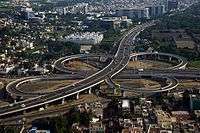
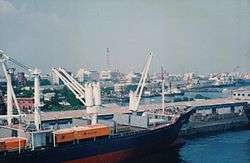
Tamil Nadu has a well established transportation system that connects all parts of the state. This is partly responsible for the investment in the state. Though the present transportation system is substantial, it needs to be developed further to keep pace with the rapid increase in use.[32] Tamil Nadu is served by an extensive road network in terms of its spread and quality, providing links between urban centres, agricultural market-places and rural habitations in the countryside. There are 28 national highways in the state, covering a total distance of 5,036 km (3,129 mi).[33] The state is also a terminus for the Golden Quadrilateral project that is 99.2% completed as of 31 July 2010.[34] Chennai CMBT and Erode Central Bus Terminus are the largest and the second largest bus terminals in Tamil Nadu respectively. The state has a total road length of 167,000 km, of which 60,628 km are maintained by Highways Department. This is nearly 2.5 times higher than the density of all-India road network.[35] It ranks second with a share of over 20% in total road projects under operation in the public-private partnership (PPP) model.[36] It is currently working on upgrading its road network, though the pace of work is considered slow.[37]
Tamil Nadu has a well-developed rail network as part of Southern Railway. Headquartered at Chennai, the present Southern Railway network extends over a large area of India's Southern Peninsula, covering the states of Tamil Nadu, Kerala, Puducherry, minor portions of Karnataka and Andhra Pradesh. Tamil Nadu has a total railway track length of 6,693 km and there are 690 railway stations in the state. The system connects it with most major cities in India. Main rail junctions in the state include Chennai, Coimbatore, Erode, Madurai, Salem, Tiruchirapalli and Tirunelveli . Chennai has a well-established Suburban Railway network and is in the process of developing a metro.
Tamil Nadu has a major international airport, Chennai International Airport, that is connected with 19 countries with more than 329 direct flights every day. Other international airports in Tamil Nadu include Coimbatore International Airport, Madurai International Airport and Tiruchirapalli International Airport. Chennai International Airport is currently the third largest airport in India after Mumbai and Delhi and has a passenger growth of 18%. It also has domestic airports at Tuticorin, Salem and Madurai make several parts of the state easily accessible. Increased industrial activity has given rise to an increase in passenger traffic as well as freight movement which has been growing at over 18 per cent per year.[38]
Tamil Nadu has three major ports at Chennai, Ennore, Kattupalli and Tuticorin, as well as one intermediate port, Nagapattinam, and seven minor ports, Rameswaram, Kanyakumari, Cuddalore, Colachel, Karaikal, Pamban and Valinokkam of which are currently capable of handling over 73 million metric tonnes of cargo annually (24 per cent share of India). All the minor ports are managed by the Tamil Nadu Maritime Board.[39] Chennai Port is an artificial harbour situated on the Coromandel Coast in South-East India and it is the second principal port in the country for handling containers. It is currently being upgraded to have a dedicated terminal for cars capable of handling 400,000 vehicles by 2009 to be used by Hyundai, Ford and Nissan Renault.[40] Ennore Port was recently converted from an intermediate port to a major port and handles all the coal and ore traffic in Tamil Nadu. The volume of cargo in the ports grew by 13 per cent over 2005.[41][42] The Tuticorin Port is expanding its facilities at the cost of US$1.6 billion.[43] The Sethusamudram Shipping Canal Project will transform the Tuticorin port into a transshipment hub similar to those in Singapore and Colombo. The ports are in need of improvement and some of them have container terminals privatised.
Tourism
Tamil Nadu has since ancient past, has been a hub for tourism. In recent years, the state has emerged as one of the leading tourist destination for both domestic and foreign tourists. Tourism in Tamil Nadu is promoted by Tamil Nadu Tourism Development Corporation (TTDC), a Government of Tamil Nadu undertaking. The state currently ranks the highest among Indian states with about 248 million arrivals in 2013.[44] The annual growth rate of the industry stood at 16 per cent. Approximately 2,804,687 foreign and 111,637,104 domestic tourists visited the state in 2010.[45]
.jpg)
The state boasts some of the grand Hindu temples built in Dravidian architecture. The Brihadishwara Temple in Thanjavur, built by the Cholas, the Airavateswara temple in Darasuram and the Shore Temple, along with the collection of other monuments in Mahabalipuram (also called Mamallapuram) have been declared as UNESCO World Heritage Sites. Madurai is home to the Madurai Meenakshi Amman Temple. Sri Ranganathaswamy Temple, Srirangam is the largest functioning temple in the world, Tiruchirappalli where the famous Rockfort Temple is located, Rameshwaram whose temple walk-ways corridor (Praagarams) are the longest 1.2 km (0.75 mi) of all Indian temples in the world, Kanchipuram and Palani are important pilgrimage sites for Hindus. Other popular temples in Tamil Nadu include those in Gangaikonda Cholapuram, Chidambaram, Thiruvannaamalai, Tiruchendur, Tiruvarur, Kumbakonam, Srivilliputhur, Tiruttani, Namakkal, Vellore, Karur, Bhavani, Coimbatore, Kanniyakumari.
Tamil Nadu is also home to hill stations like Udhagamandalam (Ooty), Kodaikanal, Yercaud, Coonoor, Topslip, Valparai, Yelagiri and Manjolai. The Nilgiri hills, Palani hills, Shevaroy hills, Kolli Hills and Cardamom hills are all abodes of thick forests and wildlife. Tamil Nadu has many National Parks, Biosphere Reserves, Wildlife Sanctuaries, Elephant and Bird Sanctuaries, Reserved Forests, Zoos and Crocodile farms. Prominent among them are Mudumalai National Park, The Gulf of Mannar Biosphere Reserve, Anaimalai Wildlife Sanctuary, Vedanthangal Bird Sanctuary and Arignar Anna Zoological Park.The mangrove forests at Pichavaram are also eco-tourism spots of importance.
Kanyakumari, the southernmost tip of peninsular India, is famous for its beautiful sunrise, Vivekananda Rock Memorial and Thiruvalluvar's statue built off the coastline. Marina Beach in Chennai is one of the longest beaches in the world. The stretch of beaches from Chennai to Mahabalipuram are home to many resorts, theme parks and eateries.The prominent waterfalls in the state are Courtallam, Hogenakkal, Papanasam, Manimuthar, Thirparappu, Pykara and Silver Cascade. The Chettinad region of the state is renowned for its Palatial houses and cuisine. With medical care in Chennai, Vellore, Coimbatore and Madurai, Tamil Nadu has the largest numbers in Medical tourism in India.
Services
Tamil Nadu has 570 engineering colleges, the most of any state in India. Tamil Nadu has a network of about 110 industrial parks and estates offering developed plots with supporting infrastructure.[46] Also, the state government is promoting other industrial parks like Rubber Park, Apparel Parks, Floriculture Park, TICEL Park for Biotechnology,[47] Siruseri IT Park, and Agro Export Zones among others. Tamil Nadu has the largest number of Small and medium enterprises (SMEs) in India.[48]
This is a chart of trend of software exports from Tamil Nadu published by Electronics Corporation of Tamil Nadu with figures in millions of Indian Rupees.[49]
| Year | Software exports | Software companies |
|---|---|---|
| 1995 | 370 | 34 |
| 2000 | 31,160 | 766 |
| 2005 | 141,150 | 1,427 |
| 2010 | 422,100 | |
| 2013 | 824,450[50] |
Chennai is the second largest software exporter in India, next to Bangalore. India's largest IT park is housed at Chennai. Software exports from Tamil Nadu during 2008–09 rose 29 per cent to touch ![]() 366.80 billion, involving a workforce of 280,000.[51] Chennai is a hub for e-publishing, as there are 47 e-publishing units registered with the STPI in Chennai and 25 in Bangalore. Companies such as HCL, Wipro, TCS, L&T, Satyam, Infosys, Zeesta (Adalricos), Cognizant Technology Solutions, Covansys, Xansa, Verizon, iSoft, Electronic Data Systems, Bally and many others have offices in Chennai. Infosys Technologies has set up India's largest software development centre to house 25,000 software professionals at an estimated investment of ₹12,500 million (US$190 million) in Chennai.[52] India's largest IT park – SIPCOT is housed at Siruseri – Chennai, It has numerous IT companies such as TCS, CTS, Syntel, Steria, Polaris, Patni, Hexaware etc. Chennai has been rated as the most attractive city for offshoring services.[53]
366.80 billion, involving a workforce of 280,000.[51] Chennai is a hub for e-publishing, as there are 47 e-publishing units registered with the STPI in Chennai and 25 in Bangalore. Companies such as HCL, Wipro, TCS, L&T, Satyam, Infosys, Zeesta (Adalricos), Cognizant Technology Solutions, Covansys, Xansa, Verizon, iSoft, Electronic Data Systems, Bally and many others have offices in Chennai. Infosys Technologies has set up India's largest software development centre to house 25,000 software professionals at an estimated investment of ₹12,500 million (US$190 million) in Chennai.[52] India's largest IT park – SIPCOT is housed at Siruseri – Chennai, It has numerous IT companies such as TCS, CTS, Syntel, Steria, Polaris, Patni, Hexaware etc. Chennai has been rated as the most attractive city for offshoring services.[53]
Government revenues
Tamil Nadu ranks fourth nationwide of all state governments in tax revenue. (See: States of India by tax revenues.) This is a chart of trend of tax revenues (including the shares from Union tax pool) extracted from the Consolidated Fund of the Government of Tamil Nadu[54] with figures in millions of Indian Rupees. See also the Finance Commission of India report.[55] Tax revenues of local bodies are excluded.
| Year | Tax revenues | Sales tax | Excise duties | Registration fees | Corporation tax | Vehicle tax |
|---|---|---|---|---|---|---|
| 1950 | 441[lower-alpha 1] | |||||
| 1955 | 270 | 112[lower-alpha 2] | 3 | 7 | ||
| 1960 | 417 | 191 | ||||
| 1965 | 723 | 409 | 4 | 99[lower-alpha 3] | 133 | |
| 1970 | ||||||
| 1975 | 3,190 | |||||
| 1980 | ||||||
| 1985 | ||||||
| 1990 | 34,508 | 20,659 | 4,348 | 2,263 | 2,273 | |
| 1995 | 79,045 | 46,892 | 9,346 | 6,130 | 3,922 | |
| 2000 | 150,659 | 81,971 | 18,686 | 9,101 | 5,904 | |
| 2005 | 253,232 | 143,607[lower-alpha 4] | 24,780 | 15,628[lower-alpha 5] | 13,846 | 11,305 |
This is a chart of trend of non-tax revenues and grants-in-aid extracted from the Consolidated Fund of the Government of Tamil Nadu with figures in millions of Indian Rupees. See also and . Non-tax revenues of local bodies are excluded.
| Year | Non-tax revenues | Interest | Mining | Grants-in-aid |
|---|---|---|---|---|
| 1960 | 197 | 114 | ||
| 1965 | 466 | 233 | ||
| 1970 | ||||
| 1975 | ||||
| 1980 | ||||
| 1985 | ||||
| 1990 | 3,814 | 897 | 588 | 12,555 |
| 1995 | 8,584 | 3,428 | 672 | 18,362 |
| 2000 | 17,107 | 4,036 | 3,953 | 15,398 |
| 2005 | 21,014 | 5,673 | 4,274[lower-alpha 6] | 28,268 |
TN Government debt
Amount in millions
Notes
Citation
- ↑ Nikhila Gill,Nikhila Gill (6 October 2010). "TN still most economically free". Express India. Retrieved 16 November 2012.
- ↑ Government Policy Notes
- ↑ M. S. Swaminathan Research Foundation
- ↑ TNPL
- ↑ "Tata group | Our businesses | Tata companies | Titan Industries". Tata.com. Retrieved 16 November 2012.
- ↑ Vestas Webpage
- ↑ "India's Gems and Jewellery Market is Glittering". Resource Investor. Retrieved 2011-08-30.
- ↑ "Tamil Nadu Poultry Industry Seeks Export Concessions". Retrieved 28 March 2015.
- ↑ "Industry of Coimbatore". Retrieved 28 June 2015.
- ↑
- ↑ Flextronics signs pact for Chennai facility
- ↑ Ericsson India Private Ltd
- ↑ Sanmina sets up manufacturing plant in Tamil Nadu
- ↑ Nokia Siemens to invest in Tamil Nadu
- ↑ Rohit, T K (18 June 2009). "TN gears up for mobile turf war". Times of India.
- ↑ Rohit, T K (10 August 2009). "1 in 2 persons in TN has a cellphone, State at Present Has 4Cr Mobile Subscribers, Second Only To Maharashtra". The Times of India (Chennai ed.). p. 3.
- ↑ "ACTIVITIES AND SCHEMES OPERATED BY DISTRICT INDUSTRIES CENTRE, VELLORE DISTRICT". Vellore District Administration. Retrieved 22 January 2011.
- ↑ "An overview of Mineral Reserves". Government of Tamil Nada. Retrieved 16 August 2006.
- ↑ Tamil Nadu Mining
- ↑ "TEDA catalyses renewable energy sector growth in Tamil Nadu". Retrieved 28 October 2006.
- 1 2 "Tapping the Wind – India". February 2005. Retrieved 28 October 2006.
- ↑ Watts, Himangshu (11 November 2003). "Clean Energy Brings Windfall to Indian Village". Reuters News Service. Retrieved 28 October 2006.
- ↑ "Wind power boosts Southern Indian economy". Aljazeera.net. 2 November 2003. Retrieved 28 October 2006.
- ↑ "Tamil Nadu faces largest power shortfall this year: Report - The Times of India". The Times of India.
- ↑ SAIL Plant
- ↑ Southern Iron and Steel Company
- ↑ Chemplast Sanmar Ltd
- ↑ "Clean Green Energy from Tamil Nadu, India". Retrieved 15 November 2006.
- ↑ "Default Parallels Plesk Panel Page". Signetsolar.com. Retrieved 16 November 2012.
- ↑
- ↑ "Moser Baer signs MoU with State on setting up photovoltaic plant". The Hindu. Chennai, India. 10 June 2008.
- ↑ Tamil Nadu Infrastructure Development
- ↑ "National Highways in Tamil Nadu". Ministry of Road Transport and Highways, Govt. of India. Retrieved 24 January 2012.
- ↑ National Highway Authority of India
- ↑ Official site for Tamil Nadu Highways
- ↑ Business Standard (19 November 2012). "Tamil Nadu ranks 2nd in road projects under PPP". Business-standard.com. Retrieved 3 December 2012.
- ↑ Highways, roads to be upgraded in Tamil Nadu
- ↑ Transportation in Tamil Nadu
- ↑ Creation of the Tamil Nadu Maritime Board
- ↑ Dedicated Ports in Chennai
- ↑ Official website for Ennore Port
- ↑ Official website for Tuticorin Port
- ↑ Expansion of Tuticorin Port
- ↑ "Tamil Nadu most popular tourist destination for domestic travellers". Times of India. Retrieved 5 July 2014.
- ↑ Tamil Nadu, Andhra Pradesh build temple ties to boost tourism. The Times of India. (10 August 2010).
- ↑ Example include Tidelpark and ITP Chennai
- ↑ TICEL Park for Biotechnology
- ↑ Archived 19 November 2008 at the Wayback Machine.
- ↑ "Status of IT industry in Tamil Nadu". ELCOT. Retrieved 16 August 2006.
- ↑ TN software trade doubled in 3 years
- ↑ Rise in software exports, says Stalin
- ↑ Infosys setting up giant centre in Chennai
- ↑ Chennai most attractive city for offshoring services
- ↑ "Tax Revenue Receipts" (PDF). Tamil Nadu Government. Archived from the original (PDF) on 24 July 2006. Retrieved 16 August 2006.
- ↑ "Finance Commission Report". Finance Commission of India. Archived from the original on 28 March 2006. Retrieved 16 August 2006.
